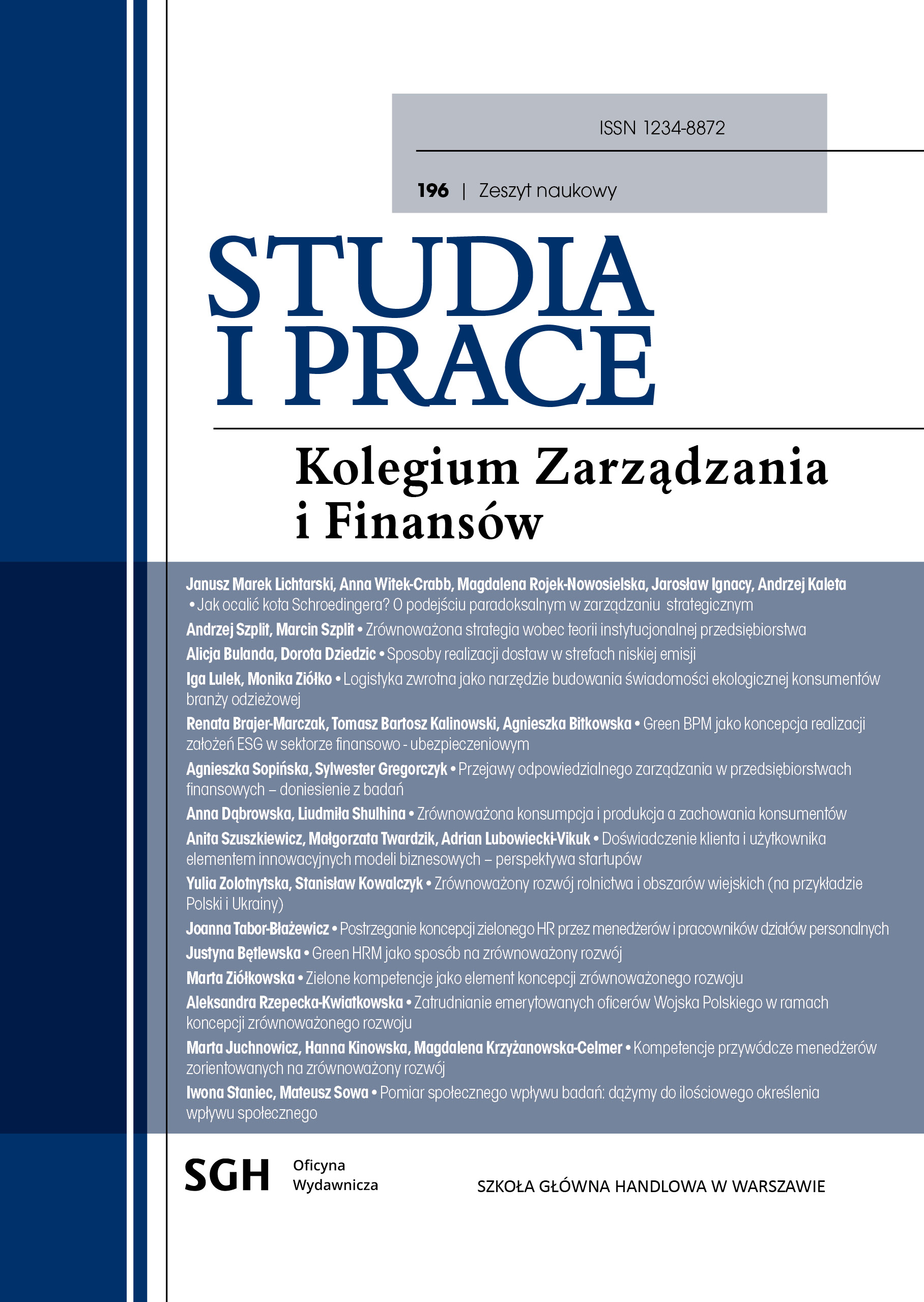Kompetencje przywódcze menedżerów zorientowanych na zrównoważony rozwój
DOI:
https://doi.org/10.33119/SIP.2024.196.14Słowa kluczowe:
kompetencje przywódcze, zrównoważone przywództwo, zrównoważony rozwójAbstrakt
Celem artykułu jest diagnoza kompetencji przywódczych polskich menedżerów względem uznawanych w literaturze przedmiotu za pożądane u menedżerów zorientowanych na zrównoważony rozwój. Na podstawie przeglądu literatury skonstruowano listę wybranych kompetencji przywódczych menedżerów zorientowanych na zrównoważony rozwój, obejmującą: orientację na działanie, otwartość na zmiany i nowości, kreatywność, inkluzywność, dbałość o rozwój i dobrostan pracowników, a także budowanie dobrych relacji i współpracy. Na próbie 263 polskich menedżerów z wykorzystaniem konfirmacyjnej analizy czynnikowej (SEM CFA) zweryfikowano empirycznie aktualnie posiadane przez polskich menedżerów kompetencje przywódcze w kontekście zrównoważonego rozwoju. Badania potwierdziły znaczenie przyjętych w modelu kompetencji przywódczych. Wykazały celowość kompleksowego traktowania trzech ich wymiarów: orientacja na działanie i zmiany, dbałość o dobrostan i relacje oraz inkluzywność.
Downloads
Bibliografia
Wydawnictwa zwarte
Avery, G. C., Bergsteiner, H. (2010). Honeybees & Locusts: The Business Case for Sustainable Leadership. Sydney: Allen & Unwin.
Bass, B. M. (1990). Bass and Stogdill’s Handbook of Leadership: Theory, Research and Managerial Applications. New York: Free Press.
Burns, J. M. (1994). Władza przywódcza. W: Władza i społeczeństwo (s. 265–269), J. Szczupaczyńsk (red.). Warszawa: Wydawnictwo Naukowe Scholar.
De Gobbi, M. S. (2011). Mainstreaming Environmental Issues in Sustainable Enterprises: An Exploration of Issues, Experiences and Options, ILO Employment Sector Working Paper Series, vol. 75. Geneva: International Labour Organization.
Goleman, D., Boyatzis, R., McKee, A. (2002). Naturalne Przywództwo. Odkrywanie mocy inteligencji emocjonalnej. Warszawa: Wydawnictwo Jacek Santorski & Co.
Juchnowicz, M., Mazurek-Kucharska, B., Turek, D. (2018). Diagnoza jakości kapitału ludzkiego w organizacji. Metody i narzędzia pomiaru. Warszawa: Polskie Wydawnictwo Ekonomiczne.
Kouzes, J. M., Posner, B. Z. (2008). The Leadership Challenge. San Francisco: John Wiley & Sons.
Krzyżanowska-Celmer, M. (2023). Uwarunkowania kulturowe kompetencji przywódczych ekspatriantów na przykładzie Chińskiej Republiki Ludowej. Warszawa: Polskie Wydawnictwo Ekonomiczne.
Stewart, H., Gapp, R. (2011). Situating Leadership to Develop CSR Sustainable Practices within an SME Context. BAM 2011 Conference Proceedings. London: British Academy of Management.
UNGC (2010). A New Era of Sustainability. UN Global Compact-Accenture CEO Study 2010. New York: United Nations Global Compact.
Artykuły naukowe
Armani, A. B., Petrini, M., Santos, A. C. (2020). What are the Attributes of Sustainable Leadership?, Revista Brasileira de Gestao de Negocios, 22, s. 820–835.
Avery, G. C., Bergsteiner, H. (2011a). Sustainable Leadership Practices for Enhancing Business Resilience and Performance, Strategy & Leadership, 39 (3), s. 5–15, 36–37.
Avery, G. C., Bergsteiner, H. (2011b). How BMW Successfully Practices Sustainable Leadership Principles, Strategy & Leadership, 39 (6). s. 11–18.
Banerjee, R., Gupta, K. (2017). The Effects of Environmental Sustainability and R&D on Corporate Risk-taking: International Evidence, Energy Economics, 65, 1e15.
Burawat, P. (2019). The Relationships Among Transformational Leadership, Sustainable Leadership, Lean Manufacturing and Sustainability Performance in Thai SMEs Manufacturing Industry, International Journal of Quality and Reliability Management, 36, s. 1014–1036.
Cheng, C., Chowdhury, F., Davila, A., Durst, S., Kraus, S. (2021). Employees’ Psychological Characteristics and Sustainable Leadership in Entrepreneurial Organizations, Journal of Small Business Strategy, 31, s. 59–71.
Eichbaum, Q. (2018). Collaboration and Teamwork in the Health Professions: Rethinking the Role of Conflict, Academic Medicine, 93 (4), s. 574–580.
Ferdig, M. A. (2007). Sustainability Leadership: Co-creating a Sustainable Future, Journal of Change Management, 7, s. 25–35.
Grzesik, K. (2023). Przywództwo w kontekście zrównoważonego rozwoju przedsiębiorstwa, Prace Naukowe Uniwersytetu Ekonomicznego we Wrocławiu, 67 (4), s. 74–82.
Hassanzadeh, M., Silong, A. D., Asmuni, A., Wahat, W. A. (2015). Global Leadership Competences, Journal of Educational and Social Research, 5 (3), s. 15–24.
Iqbal, Q., Ahmad, N. H., Nasim, A., Khan, S. A. R. (2020). A Moderated-mediation Analysis of Psychological Empowerment: Sustainable Leadership and Sustainable Performance, Journal of Cleaner Production, 262, 121429.
Iqbal, Q., Ahmad, N. H., Halim, H. A. (2020). How Does Sustainable Leadership Influence Sustainable Performance? Empirical Evidence from Selected ASEAN Countries, Sage Open, 10 (4), s. 1–16.
Javed, A., Iqbal, J., Iqbal, S. M. J., Irman, M. (2020). Sustainable Leadership and Employee Innovative Behavior: Discussing the Mediating Role of Creative Self-efficacy, Journal of Public Affairs, 21 (1), e2547.
McCann, J. T., Holt, R. A. (2010). Defining Sustainable Leadership, International Journal of Sustainable Strategic Management, 2 (2), s. 204–210.
Peterlin, J., Pearse, N., Dimovski, V. (2015). Strategic Decision Making for Organizational Sustainability: The Implications of Servant Leadership and Sustainable Leadership Approaches, Economic and Business Review, 17 (3), s. 273–290.
Piwowar-Sulej, K., Krzywonos, M., Kwil, I. (2021). Environmental Entrepreneurship-bibliometric and Content Analysis of the Subject Literature Based on H-Core, Journal of Cleaner Production, 295, 126277.
Rehman, S., Sami, A., Haroon, A., Irfan, A. (2019). Impact of Sustainable Leadership Practices on Public Sector Organizations: a Systematic Review of Past Decade, Journal of Public Value and Administration Insights, 2 (3), 1e5.
Shaaban, S. A. (2020). The Impact of Responsible Leadership (RL) on Responsible Employee (RE): The Mediating Role of Sustainable Leadership (SL), International Journal of Business Management, 15, s. 75–84.
Szczepańska-Woszczyna, K., Francik, A. (2016). Przywództwo a zrównoważony biznes w małych i średnich przedsiębiorstwach, Przegląd Organizacji, 7 (918), s. 27–34.
Materiały internetowe
Cambridge Institute for Sustainability Leadership (CISL) (2018). A Behavioral Competency Model for Sustainable Leaders, https://www.cisl.cam.ac.uk/system/files/documents/a-behavioural-competency-model-for-sustainability.pdf (dostęp: 22.01.2024).
Center for Excellence in Leadership (2007). Leadership for sustainability: Research report.Leadership for sustainability: making sustainable development a reality for leaders, (dostęp: 12.01.2024).
EY (2023). Na czym polega zasada zrównoważonego rozwoju? Zrównoważony rozwój – filary i przykłady działań, https://www.ey.com/pl_pl/consulting/zasada-zrownowazonego-rozwojuna-czym-polega (dostęp: 20.12.2023).
Morton, S., Grayson, D. (2009). Who Should Head up Your Corporate Responsibility Approach?, https://dspace.lib.cranfield.ac.uk/bitstream/1826/4205/1/Who_should_head_up_ your_CR_approach.pdf (dostęp: 27.12.2015).
The ERM International Group Limited (2023). ERM Sustainability Report 2023. The time is now (ERM), https://www.erm.com/sustainability-report/ (dostęp: 22.01.2024).
The Sustainability Institute by ERM (2023). Sustainability Leaders Report (SLR), https://globescan.com/2023/09/06/2023‑globescan-sustainability-leaders-survey-report-webinar/ (dostęp: 22.01.2024).
Visser, W., Courtice, P. (2011). Sustainability Leadership: Linking Theory and Practice, https://ssrn.com/abstract=1947221 (dostęp: 17.12.2023).
WBCSD (2011). People Matter Lead. Enabling Leadership for Sustainability, http://odpowiedzialnybiznes.pl/wp-content/uploads/attachments/news/PeopleMatterLead_WBCSD_2011.pdf (dostęp: 12.01.2024).
Pobrania
Opublikowane
Jak cytować
Numer
Dział
Licencja
Prawa autorskie (c) 2024 Studia i Prace Kolegium Zarządzania i Finansów

Utwór dostępny jest na licencji Creative Commons Uznanie autorstwa 4.0 Międzynarodowe.









